SEO enthusiasts and SEA professionals have always tended to work separately without considering the other. And yet, SEO and SEA techniques are complementary. Companies can get great results by combining both methods to quickly rank on the SERP.
What do they share in common? What sets them apart? How can these two strategies be implemented simultaneously without harming each other?
The answer is right down below!
SEO vs. SEA: what’s the difference?
The first one is related to organic referencing, while the second one is limited to paid referencing. Both are related to Google and have a common objective: to position a website on strategic queries in order to grow traffic and sales. SEO (Search Engine Optimization) and SEA (Search Engine Advertising) are today the two main strategic tools used by brands to reach or remain in Google’s Top 3 positions.
Eye-tracking: which areas are viewed the most?
The first major difference between the two is the position of Adwords ads as opposed to organic search results.
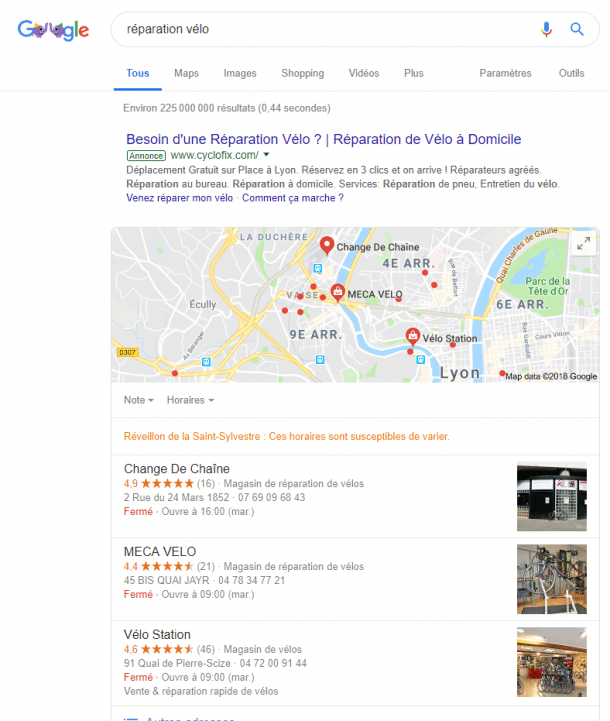
We notice that the paid ads generated through Google Adwords are positioned at the top of the search results page. Precisely where the eyes of online users naturally rest. This is no coincidence. Since it’s Google itself that collects SEA revenues, it is easy to understand why Adwords ads are positioned in front of the organic results. As always, business is business.
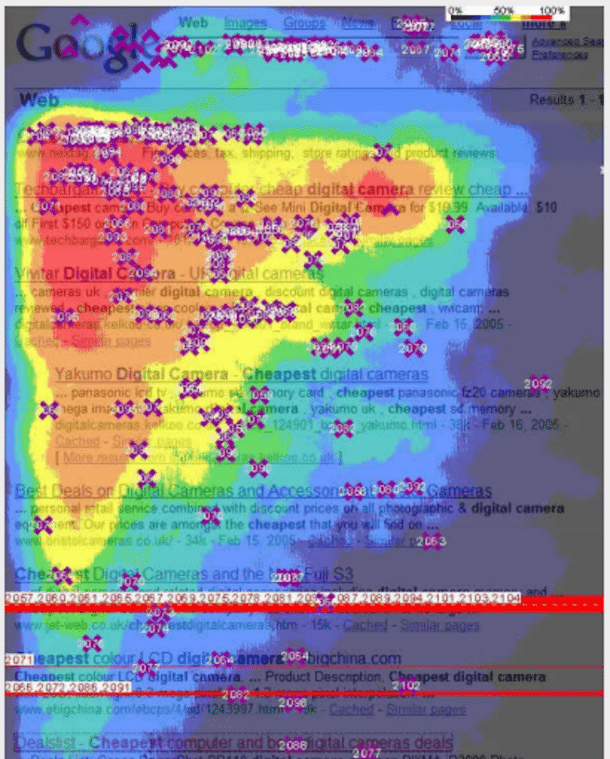
Before 2010, eye-tracking studies had identified the famous golden triangle – the area in which it was vital to be if you ever wanted to be seen by users and for your traffic to take off. Back then, few users saw a difference between paid ads and organic results, but this is no longer the case. The golden triangle has gradually given way to a more spread-out zone.
It reveals that users spend less time on ads, and are more likely to browse for other results. This implies that they spend less time looking at each result individually. This shift in viewing search results is most likely caused by mobile usage with its top to bottom scroll and screen-scanning. As opposed to the traditional right to left scanning on desktops.
Paid ads vs. Organic results: what gets the most clicks?
Clicks are, by definition, the most revealing indicator of what online users truly do, and what attracts them the most.
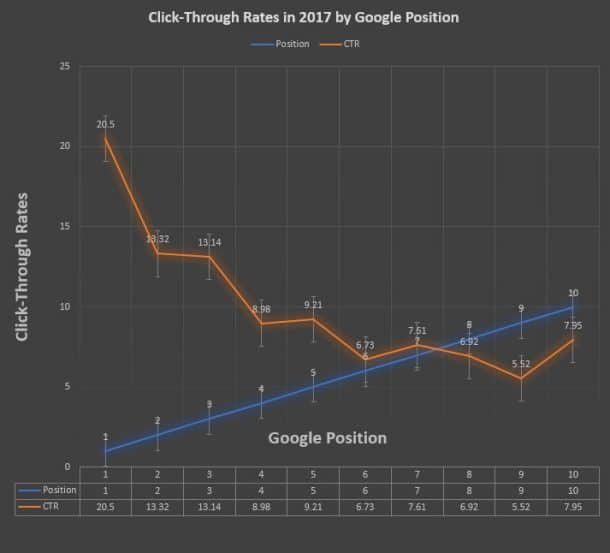
There is a clear increase in clicks on organic results beyond the 1st result, which implies that websites positioned from the 2nd to the 10th position (virtually all of those on the 1st page on Google) benefit from better visibility than before.
Clicks on paid campaigns are stable.
Strategically, if you position your website through an Adwords ad AND among the first organic search results, you have every chance of attracting a lot of visitors to your website. This double positioning on Google will boost your authority!
The main difference between SEO and SEA is purely financial. While the first one can be worked internally or entrusted to a specialized external provider, the second one only goes through Google and simply consists of buying one’s position on auction on a defined keyword.
What’s SEA?
Definition of SEA
SEA stands for Search Engine Advertising which consists of using paid advertising to improve your visibility on search engines. Advertisers use a bidding system to rank on keywords. Google offers different types of bids: CPM (Cost Per Thousand), CPA (Cost Per Acquisition), or CPC (Cost Per Click).
The one and only tool for SEA on Google is Adwords.
Quick and effective, SEA remains quite difficult to approach without a strong technical background.
SEA challenges
With SEA, if you have enough budget, it can help your website quickly attract a lot of traffic. This method is adapted to new websites that have no organic positioning and wish to quickly catchup with competitors.
Paid ads allow you to attract traffic while waiting for your SEO efforts to bear fruit. Unlike SEO, SEA allows you to overtake your competitors within a few hours of launching the ads.
For one-time needs or seasonal events, SEA can be a great “on-demand” alternative to spend your budget on if you need to boost your visibility.
Paid referencing offers give you full control of costs and the duration your ads will be active.
The advantages of SEA and paid referencing
Rank fast
If your website needs a quick positioning on Google, for a promotion, or for an event, for example, Adwords can be a great alternative.
You can control your budget and decide the precise amount to use on this marketing action.
Accurate targeting
If you have properly configured your ads, the online users who will click on your sponsored link will necessarily interested in your product or service. When setting up your Adwords campaign, leave aside all the keywords that are too broad or generic and that could use up all of your budget unnecessarily.
For example, in the case of Semji, it would not be relevant to bid on the keyword “SEO”. In this scenario, our website will be visible to every online users who are looking for information on the topic.
However, if we position ourselves on ” SEO e-reputation agency Lyon”, our website will be visible to everyone who searched for an agency specialized in organic referencing AND e-reputation AND based in Lyon.
This is why it is important to spend as much time as needed to define the best target as clicks can be very expensive! So, while you’re at it: you might as well pay to attract highly qualified and interested users!
Instant visibility
SEA is expensive, but you pay to get the best visibility throughout the duration of your campaign. You know in advance the area in which your website will be displayed, in this case at the top of the search results page among the sponsored ads. Nothing new here!
As soon as the ads are launched, your website will be immediately rank.
Increased budget control
When setting up your SEA campaign, you define the budget you want to spend on it: the overall budget to spend throughout the campaign and the maximum cost you are willing to pay for a lead.
Once again, no surprises! However, a limited budget implies that your results will also be limited…
The disadvantages of paid referencing
No traffic without budget
While setting up a paid campaign gives immediate results in terms of traffic and positioning, stopping it will also make your website instantly disappear from the top positions if you do not have a strong SEO rank.
The more budget you put into your Adwords campaign, the more traffic you’ll get on your website!
A complex tool that can scare
Google Adwords quite hard to learn, especially if you are not used to managing bids and setting up keyword strategies. This means that you can unnecessarily waste money if the strategy is not well thought out and restricted, beforehand.
Keyword bids that quickly add up
Do you work in a very competitive industry? The cost of your Adwords campaign can quickly soar, especially from competition on highly sought-after keywords. You will have to pay a high price for your keywords or fall back on other less strategic, but more affordable ones…
In short, SEA provides you with a lot of flexibility. This type of referencing fixes 3 types of issues:
- to quickly rank, in the short-term, at the top of the first page of the SERP,
- a paid advertising campaign with a very large budget,
- a website targeting a niche, where keywords are cheap.
The complexity of the tool means that this work should be done by professionals if you don’t have time to spend on training and strategic thinking.
What is SEO?
About SEO, aka natural referencing
SEO consists of optimizing a website to appear among the first organic results on Google on specific queries. This SEO technique allows a brand to expand its empire on the web and increase its popularity sustainably.
If an SEO strategy allows for long-term positioning, it is because the optimization work is done on the structure of the site itself, in-depth: tree view, code, content … The website is also constantly updated with new content and receives links from external websites.
Brands with a long-term vision tend to use SEO more than SEA. Thanks to SEO, a website is slowly but surely moving towards a long-lasting positioning.
The volume of your traffic is not conditioned by the number of your bids but by your positioning in the organic results.
With an Adwords strategy, the more traffic you have, the more you pay. With SEO, costs remain the same, whether you have 1 visitor or 100,000 visitors per day!
Less flexible but more stable, SEO is essential for companies whose strategy is defined from the beginning and is not prone to constant change. The efforts made in SEO are rewarded by a stronger brand image and better quality leads acquired over time.
The advantages of SEO over SEA
Better long-term profitability
Building quality SEO is a long term work, the first results usually appear after 6 months. But your patience will be rewarded because it is an extremely profitable strategy in the long run.
If the majority of companies put their efforts on SEO before allocating funds to another part of their web strategy, it’s because it has a much lower traffic acquisition cost – compared to SEA – and is often the first tool you can use to increase your presence online. Less expenses, more results: what more could you ask for?
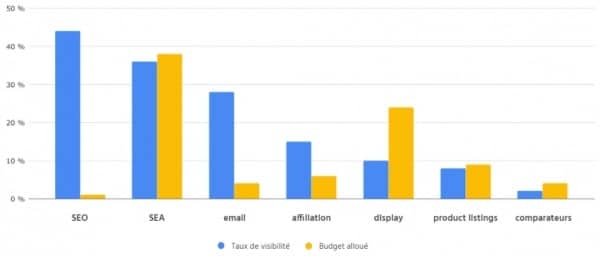
Stable and increased traffic
If the results following the implementation of an SEO strategy take several months to start showing signs, it is because they are much more stable. Even if a well-established website on Google might see changes in its positioning, it will remain stable and keep a constant flow of online traffic over time. It has little chance of falling from the 1st page to the 150th page overnight. The only possible reasons for such a sudden drop are a manual penalty or a change of algorithm (or both).
When you run an SEA campaign, the reality is quite different: as long as you pay, your website ranks high in the results. If you stop paying, it disappears instantly and completely.
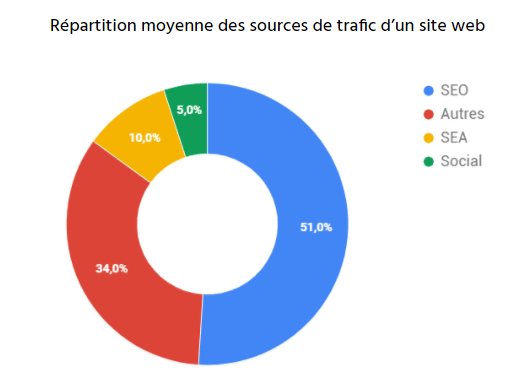
By comparing the different sources of a website’s traffic, we notice that more than 50% of online users come from SEO, which makes it the #1 acquisition channel. SEA, on the other hand, attracts only 10% and only comes in second to last position.
Secure your ranking
Investing in SEO leads to exponential results. If it is necessary to double down on the work at the beginning to start noticing the first positive effects, it is then simply a matter of staying consistent on your work to remain in top positions. An SEO strategy starts with an audit, several on-page actions to lay the foundations, and then some off-page actions to boost your positioning.
Once your website ranks well and to keep great results in the long run, keep implementing good SEO habits and consistently post new content combined with a few backlinks. Results will be guaranteed. Unlike SEA, putting SEO actions on hold for a while will not send your website to the bottom of the first page. Of course, we recommend staying consistent, but all your hard work will not vanish if you go on vacation for a few weeks or if you abandon your website during some period.
More high-quality websites
Google prefers websites that meet a certain number of quality requirements. As opposed to SEA where any brand willing to pay the price will be able to benefit from good rankings. From an SEO perspective, a website will need to have strong technical bases: structure, UX, loading time, high-quality content…
Having a budget is not enough to excel in SEO, and this is really what makes the battle interesting!
You don’t need a big budget to do SEO, this is why it is interesting and accessible to all!
The disadvantages of SEO
If SEO has many advantages, it however has some disadvantages that should be considered before getting started.
SEO takes time
Unlike SEA where you just have to pay to rank high, SEO requires in-depth work, a strategic reflection followed by real actions.
This implies that:
- Building an SEO Friendly website takes time between strategy development and deployment;
- It also takes time to see the first positive effects, it takes on average 6 months.
If your website will take several months to rank, it is important to note that SEO does not offer a quick ROI. But once acquired, the growth of traffic to your website will be exponential.
Google algorithms remain a mystery
Betting on natural referencing means accepting the fact that everything can change from one day to the next. You are in 1st position on a key query and your business is running perfectly. Then one day, Google decides to update one of its algorithms or to launch a new one, and you find yourself on the 5th page. SEO is also this uncertainty linked to algorithm changes, at Google’s whim. Knowing how to bounce back is essential for any company that relies on SEO.
Beware of penalties
External links, duplicated content, over-optimization, and so on: Google penalties kind are always looming over your head… or rather over your website! If you go for SEO, you have to accept to see your website’s ranking change from one day to the next, without warning. Keep in mind that you need to have a strong foundation, apply best practices and keep up with this ever-changing method if you want to survive in SEO.
Some people mistakenly think that SEO is easy and quick, that all it takes is a couple of blog posts and a bit of netlinking to get your website to rank at the top of the SERP.
But SEO is a bit more complex than that. The slightest over-optimization, the slightest mistake, can have instant catastrophic consequences on your website’s ranking!
SEO and SEa work great together
While SEA and SEO can be combined to increase the power of your marketing strategy, every web project is different and there is no right or wrong answer.
For some brands, SEO will be the best solution. For others, SEA will be more than enough to meet given goals. For others, using both can be essential!
These two acquisition channels are complementary: each search result gets a certain percentage of clicks. Depending on the position of the organic result compared to the Ads result, the behavior of online users will be different. Both are beneficial as several positions on the SERP will help the brand increase its authority and trust with users.
If you decide to implement a traffic acquisition strategy combining both SEO and SEA, take time to carefully study keywords to avoid wasting your Adwords budget!
To grow your audience, you need to position yourself on new queries. List the queries on which you are already positioned in the organic results and try to attract additional traffic using other keywords and search queries!
You can also test the potential and relevance of a keyword related to your business by first doing a few Adwords ads on that keyword, before implementing it into your SEO strategy.
Are you about to launch a new website and you need to rank quickly? Then consider implementing an SEA strategy to start getting leads, and grow your SEO at the same time. When your website has reached the desired position on the SERP, you can allocate the budget you were spending on Adwords into SEO to sustain your rankings.
When it comes to ROI, it’s generally SEO that wins in the long run, with reduced acquisition costs and exponential traffic growth! With the rise of the semantic web and voice search, SEO still has a bright future ahead of it, where paid formats are still struggling to provide accurate answers to users.
Are you planning to implement an SEO strategy? Our team is here to help you and answer your questions!
